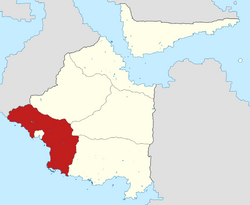Libertarya: Difference between revisions
(Created page with "{{Region icon Conch Kingdom}} {{Infobox settlement | name = Libertarya | native_name = <small>''Libertaria'' (Santian)</sm...") |
mNo edit summary |
||
| Line 113: | Line 113: | ||
'''Libertarya''' ([[Santian language|Santian]]: ''Libertaria'') is a [[Federal subjects of Liberto-Ancapistan|province]] in the [[Basaqastan]] region of [[Liberto-Ancapistan]]. It is the country's largest federal subject by population, with 16.84 million inhabitants as of 2025, and the 6th largest by land area, covering 99,459 km². The largest city in Libertarya is [[Sades]], its capital and the second-largest city in Liberto-Ancapistan; other major cities include [[Luqiu]], [[Silosovia]], [[Selitos]] and [[Saraki]]. | '''Libertarya''' ([[Santian language|Santian]]: ''Libertaria'') is a [[Federal subjects of Liberto-Ancapistan|province]] in the [[Basaqastan]] region of [[Liberto-Ancapistan]]. It is the country's largest federal subject by population, with 16.84 million inhabitants as of 2025, and the 6th largest by land area, covering 99,459 km². The largest city in Libertarya is [[Sades]], its capital and the second-largest city in Liberto-Ancapistan; other major cities include [[Luqiu]], [[Silosovia]], [[Selitos]] and [[Saraki]]. | ||
The province of Libertarya was formed from the former territories of the [[Republic of Libertarya]], the largest predecessor state of Liberto-Ancapistan, excluding [[Ciona-Libertarya]], which became part of [[Rojava-Navenda]]. In 1966, the historic capital of the province, [[Bajazad]], was separated from Libertarya as a new province in order to reduce a growing imbalance in population distribution; despite this, Libertarya continues to comprise over 24% of total population of Liberto-Ancapistan. The province has a varied climate and geography, with significant ranges of hills inland, flat coastal plains, and the southernmost portion of the [[Ciona Mountains]]. It is typically grouped into three main geographic and cultural regions, [[Transcionan Libertarya]], [[West Libertarya]], and [[East Libertarya]]. | The province of Libertarya was formed from the former territories of the [[Republic of Libertarya]], the largest predecessor state of Liberto-Ancapistan, excluding [[Ciona-Libertarya]], which became part of [[Rojava-Navenda]]. In 1966, the historic capital of the province, [[Bajazad]], was separated from Libertarya as a new province in order to reduce a growing imbalance in population distribution; despite this, Libertarya continues to comprise over 24% of the total population of Liberto-Ancapistan. The province has a varied climate and geography, with significant ranges of hills inland, flat coastal plains, and the southernmost portion of the [[Ciona Mountains]]. It is typically grouped into three main geographic and cultural regions, [[Transcionan Libertarya]], [[West Libertarya]], and [[East Libertarya]]. | ||
Libertarya is the wealthiest province of Liberto-Ancapistan by Gross value added (GVA) and second-wealthiest by GVA per-capital, home to a significant proportion of Liberto-Ancapistanian industries, particularly in mechanical engineering, electrical engineering, agriculture and the service sector. It is also the location of the [[University of Silosovia]], the most prestigious higher-education institution in Liberto-Ancapistan. Because of its size and economic strength, Libertarya has historically played a central role in Liberto-Ancapistanian politics, providing the main support base for its largest political party, the [[Libertarian Party (Liberto-Ancapistan)|Libertarian Party]] (named after the province), as well as four of its nine [[Chancellor of Liberto-Ancapistan|chancellors]]. Local government in Libertarya uses a modern form of the traditional [[Takber system]], incorporating a significant degree of decentralisation and {{wp|direct democracy}}. | Libertarya is the wealthiest province of Liberto-Ancapistan by Gross value added (GVA) and second-wealthiest by GVA per-capital, home to a significant proportion of Liberto-Ancapistanian industries, particularly in mechanical engineering, electrical engineering, agriculture and the service sector. It is also the location of the [[University of Silosovia]], the most prestigious higher-education institution in Liberto-Ancapistan. Because of its size and economic strength, Libertarya has historically played a central role in Liberto-Ancapistanian politics, providing the main support base for its largest political party, the [[Libertarian Party (Liberto-Ancapistan)|Libertarian Party]] (named after the province), as well as four of its nine [[Chancellor of Liberto-Ancapistan|chancellors]]. Local government in Libertarya uses a modern form of the traditional [[Takber system]], incorporating a significant degree of decentralisation and {{wp|direct democracy}}. | ||
Revision as of 18:12, 20 June 2023
Libertarya
Libertaria (Santian) | |
|---|---|
 | |
| Country | Liberto-Ancapistan |
| Capital | Sades |
| Government | |
| • Body | Parliament of Libertarya |
| • Prime Minister | Place Holder (Libertarian Party) |
| • Governing party | Libertarian Party |
| • House of Asagi seats | 37 (of 115) |
| • House of Commons seats | 125 (of 520) |
| Area | |
| • Total | 99,459 km2 (38,401 sq mi) |
| Population (2025) | |
| • Total | 16,836,000 |
| • Density | 170/km2 (440/sq mi) |
Libertarya (Santian: Libertaria) is a province in the Basaqastan region of Liberto-Ancapistan. It is the country's largest federal subject by population, with 16.84 million inhabitants as of 2025, and the 6th largest by land area, covering 99,459 km². The largest city in Libertarya is Sades, its capital and the second-largest city in Liberto-Ancapistan; other major cities include Luqiu, Silosovia, Selitos and Saraki.
The province of Libertarya was formed from the former territories of the Republic of Libertarya, the largest predecessor state of Liberto-Ancapistan, excluding Ciona-Libertarya, which became part of Rojava-Navenda. In 1966, the historic capital of the province, Bajazad, was separated from Libertarya as a new province in order to reduce a growing imbalance in population distribution; despite this, Libertarya continues to comprise over 24% of the total population of Liberto-Ancapistan. The province has a varied climate and geography, with significant ranges of hills inland, flat coastal plains, and the southernmost portion of the Ciona Mountains. It is typically grouped into three main geographic and cultural regions, Transcionan Libertarya, West Libertarya, and East Libertarya.
Libertarya is the wealthiest province of Liberto-Ancapistan by Gross value added (GVA) and second-wealthiest by GVA per-capital, home to a significant proportion of Liberto-Ancapistanian industries, particularly in mechanical engineering, electrical engineering, agriculture and the service sector. It is also the location of the University of Silosovia, the most prestigious higher-education institution in Liberto-Ancapistan. Because of its size and economic strength, Libertarya has historically played a central role in Liberto-Ancapistanian politics, providing the main support base for its largest political party, the Libertarian Party (named after the province), as well as four of its nine chancellors. Local government in Libertarya uses a modern form of the traditional Takber system, incorporating a significant degree of decentralisation and direct democracy.
